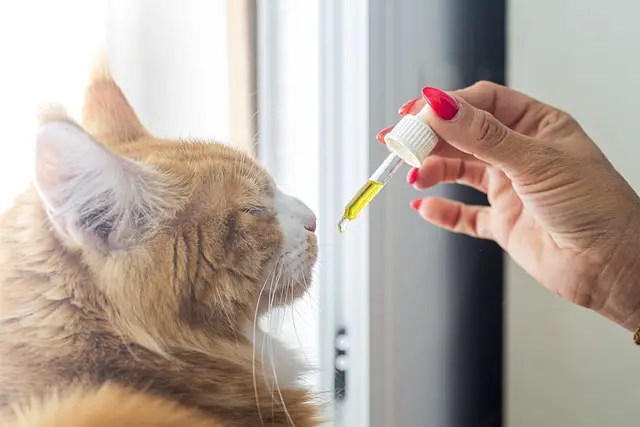CBD for Cats with Kidney Disease: Hope or Hype?
The cannabis market is currently developing products specifically for pets, so many pet owners are seeking information on the medicinal properties of various weed products for their cats. Many vets and feline pet owners have expressed increased interest in CBD products, specifically food supplements and medically enhancing products. Unfortunately, cats are the most underserved clientele in the CBD industry, meaning they have the smallest number of treatment options for their wide range of diseases. In this article, we highlight what cannabidiol is, how it interacts with your kitty’s body, and how it may help manage several conditions.
Defining Cannabis, CBD, and THC
There is significant controversy and stigma surrounding these three words. As a pet owner, it is crucial to debunk some common misconceptions to fully understand their meanings and implications on your cat’s health. “Cannabis” is the scientific name for the plant popularly known as weed. This plant has numerous varieties, each with different properties and effects on human and animal consumers. Certain cultivars produce marijuana, which is illegal under federal law, while others produce hemp, which is legalized for commercial and medicinal purposes.
It is essential to know that the cannabis plant used to make hemp for commercial purposes is different from the cannabis plant used to make hemp products for health and wellness reasons. Cannabis plants contain CBD (cannabidiol) and THC (tetrahydrocannabinol), both with specific medicinal benefits. CBD cannot induce a ‘high,’ whereas THC is psychoactive and will cause a euphoric effect. Only cannabis products containing less than 0.3% THC are permitted for sale and distribution in most US states without a prescription.

What’s the Hype behind Medical Cannabis?
Although there is emerging research on the use of cannabis for canines and felines, much of what we know today is based on anecdotal evidence or extrapolation from human studies. Most anecdotal accounts comprise individual experiences of cannabis use on pets. For instance, if a cat accidentally consumed medical cannabis, the owner may have observed alleviation of symptoms. Perhaps the beloved companion could leap on the bed again or become more playful after consuming the medical marijuana.
Evidence suggests CBD can reduce or eliminate seizures, inflammation, anxiety, and discomfort episodes and enhance your cat’s overall health. Read this study report if you want to have a better understanding of CBD and the physiology that underlies cannabis’s effects on pets.
How Does Cannabis Work in Your Cat’s Body?
The endocannabinoid system (ECS) is comprehensive in human and animal bodies. This receptor-based system is located in the central nervous system, which consists of the brain, spinal cord, and nerves, influencing various pain, mood, and immune function processes. These receptors bind THC and CBD, among other cannabis-derived compounds.
Though there is still much to learn about the human and animal endocannabinoid systems, it is known that canines and felines have significantly more THC receptors (CB-1) than humans. This is why our pets are more sensitive to the effects of THC than humans. In other words, the amount of THC required for a human to feel comfortably euphoric can induce an extremely high with a detrimental impact on a cat’s nervous system. As cannabis becomes legalized throughout the United States, veterinarians will have more chances to understand the distinction between hemp and marijuana.

What Is Cat Kidney Disease?
Have you noticed that your cat has been throwing up, urinating more frequently, eating less, or consuming much water? If you responded yes, now is the ideal moment to take your pet to the doctor since these are symptoms of kidney illness. The kidneys are critical to your cat’s health; if they fail, they can cause serious problems, including some that are life-threatening. A healthy kidney removes toxins, controls blood pressure, maintains electrolyte balance, regulates hydration, controls calcium, and generates hormones that create red blood cells. When a cat has kidney disease, the kidneys halt some or all of these processes, resulting in dangerously elevated levels of blood toxins. Kidney disease risk increases with age, affecting one in three cats.
Two types of kidney failure can affect cats:
- Acute Renal Failure occurs when kidneys suddenly quit working and fail to eliminate excess fluids, salt, and blood waste. In healthy cats, acute kidney failure is reversible through dietary changes and medication to improve kidney function.
- Chronic Kidney Disease (CKD) refers to the gradual loss of kidney function that develops when an ailment inhibits kidney activities over a long period, thus resulting in kidney deterioration and eventual damage. There’s no known cure for CKD in humans and animals though the condition can be managed with phosphate binders, potassium supplements, therapy, and IV fluid injections. In extreme situations, hemodialysis and transplants are adopted as treatment plans.
Does CBD Oil Help Cats with Kidney Disease?
Veterinarians claim CBD is generally safe for cats, though some susceptible kittens might initially experience unpleasant side effects. The adverse effects subside naturally after CBD is discontinued or the dosage is decreased. Although mild, these side effects may include diarrhea, dry mouth, and vertigo. A 12-week study in which CBD was administered to cats revealed minimal adverse effects, no diarrhea, no changes in behavior or food intake, and no significant changes in body weight.
Current research and studies indicate CBD is harmless for cats with renal disease. Although CBD won’t cure kidney illness, it can help you manage the symptoms. As with conventional treatments for kidney disease focusing on symptomatic relief, CBD can help mitigate some of the negative symptoms a cat may experience.
How CBD Helps Manage Cat Kidney Disease Symptoms
Below are some symptoms of cat kidney disease and how CBD deals with each.
Bacterial Infections
Recent research shows that pharmaceutical cannabidiol can destroy the bacteria that cause gonorrhea, meningitis, and Legionnaires’ disease. According to studies, CBD is effective against more Gram-positive bacteria than was previously believed, including antibiotic-resistant infections such as MRSA.
Constipation/Diarrhea
The presence of cb1 receptors in the brain and central nervous system can help soften the nerve fibers in the bowel. CBD’s anti-inflammatory and antimicrobial properties could be helpful in various gastrointestinal complaints.
Bloody/Turbid Urine
CBD’s anti-inflammatory and antimicrobial properties may help reduce bloody or turbid urine.
Spikey, Dull, or Dry Coat
There are no studies on the effects of CBD on dry cat coats; however, if you asked pet owners who use CBD supplements, they would highlight skin and coat improvements.
Vomiting
According to a study published in the British Journal of Pharmacology, preclinical research suggests that cannabinoids, including CBD, may be clinically effective for treating nausea and vomiting caused by chemotherapy or other treatments.
Other symptoms include weight loss, bad breath, increased thirst, and decreased appetite, which may not be directly solved by consuming CBD, but the side effects of cannabis may improve such symptoms.
Best CBD Products for Cats with Kidney Disease
There are various CBD product types for pets, including oils, pellets, creams, and treats. You get to choose the products you find easiest to administer and within your budget. If you’re searching for the best CBD for cats with kidney disease https://askgrowers.com/cbd/cbd-oil-for-cats-with-kidney-disease shares a wide range of products that suit your cat’s needs and rigorous safety criteria.
Final Thoughts
Administering CBD to your cat with renal problems should be safe if it is hemp-derived and contains less than 0.3% THC. CBD may cause some adverse effects, but its positive impact surpasses its risks by a wide margin. CBD alleviates several symptoms of kidney disease, enabling your beloved cat to live a full life. Always choose a high-quality CBD product for your cat and ensure that the CBD is derived from organic hemp and has been tested in a laboratory.
The material was prepared by Denys Svirepchuk, an expert in cannabis products and a regular blogger at AskGrowers. Denys continually researches the market and shares his findings and top product picks with users considering CBD for themselves and their furry companions. All blogs are data-backed and based on clinical research findings.